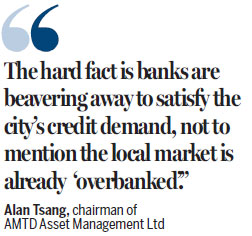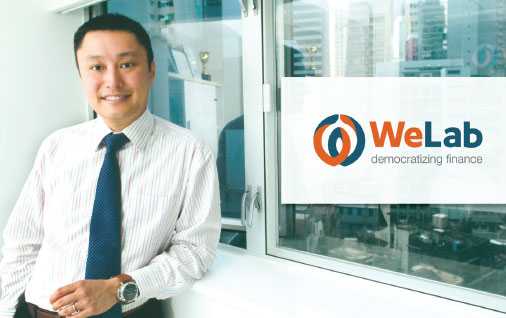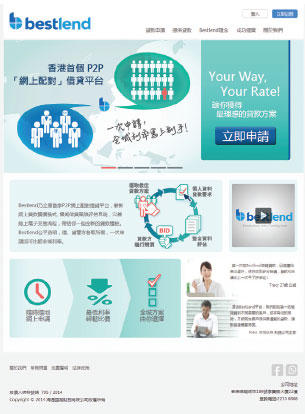Strictly among peers
Updated: 2015-02-06 07:20
By Luo Weiteng(HK Edition)
|
|||||||
Online lending is putting up a serious challenge to traditional banking in Hong Kong but there may be a few wrinkles to smooth out. Luo Weiteng reports.
As Internet lending continues to be big business globally, companies in Hong Kong, where the Internet finance market is by and large ticking over, are in a good position to disrupt traditional banking with their online approach.
Amid the increasingly popular online lending concepts, peer-to-peer (P2P) lending is one of the most fashionable, allowing individual investors to directly lend money online, bypassing the middlemen - banks.
WeLend, the city's first homegrown P2P player, closed a Series A funding round topping off at $20 million in January.
The company has facilitated "nearly HK$1 billion in loans" since its founding in July 2013 and experienced "about 400 percent year-on-year growth last year", according to Simon Long, founder and CEO of WeLend's parent company, WeLab.
Later in January, Haitong International Securities Group launched a P2P lending platform called "Bestlend.com", signaling its foray into the realm of Internet finance.
However, the chilling fact is that many P2P players in the territory do not do business in a pure P2P way. Coming into being as a P2P platform, WeLend now defines itself as more of an online lender.
With a solid roster featuring big-name investors including Li Ka-shing's TOM Group and US-based Sequoia Capital, WeLend, holding a money lender's license, currently only accepts loans from lenders in the company's private network.
As a banking veteran of 15 years, Long had no difficulty finding financing for the platform.
Teething troubles
"Therefore, we decided to be an online lender rather than a pure P2P platform, because this is where our competitive edge lies," said Long.
Similarly, Haitong's Bestlend.com is initially focusing its lender base on professional and institutional investors, closing the door on individual investors.
"Under Hong Kong's current regulatory structure, P2P lenders are required to hold a moneylender's license, which is far from accessible to individual investors," said Fanny Chen, assistant director of Internet financing at Haitong Securities.
Yet, Long believes P2P lending is "only a means to an end" and should not make up the whole borrowing story.
Even Lending Club, the world's largest online loan broker, which has some shareholders in common with WeLab, is not a pure P2P lending platform, he said.
According to market intelligence, a third of Lending Club's capital comes from institutional investors, and another third comes from high-net-worth individuals and family offices. Only the remaining third come from individuals, contributing to Lending Club's P2P lending nature.
"Capital from institutional investors usually comes in large sums, which can contribute to more deals. When lenders and borrowers on the platform are both individuals, you have to divide your resources to take care of both sides," Long said.
"But concentrating resources on one side will be more ideal. In fact, if a high-quality borrower base is set up, you can simply wait for investors to line up to pour funding into your platform.
"We will get much flexibility by lending on our balance sheet."
Yet on the flip side, institutional investors mean a less stable funding source. During an economic downturn, institutional capital is usually withdrawn from the market rapidly, much faster than individual capital, explained Long.
But the Hong Kong version of the story is a bit different. "Thanks to the diversified financing channels and lower interest rate, Hong Kong enjoys a low cost of funding. Historically, the city's credit loss, hovering around 3 to 3.5 percent, also remains at a low level. Therefore, an economic downturn could hardly be forecast," Long said.
"Even if it happens, you can still expect a low bad loans rate, thus making investors less likely to pull the plug."
Even setting aside the argument over a pure P2P business model, some people remain skeptical about the outlook of the city's online lending business. Though informal lending clubs are common in Hong Kong, barriers to entry for online lending business include stringent financial regulations and competition from dominant players in the banking industry such as HSBC, Standard Chartered and Citicorp.
"The hard fact is banks are beavering away to satisfy the city's credit demand, not to mention the local market is already 'over-banked'," said Alan Tsang, chairman of Hong Kong-based AMTD Asset Management Ltd, who is concerned that stiff competition among banks leaves less room for online lenders to muscle in on their loan business.
A narrow local market and cutthroat local competition is a fact of life for Hong Kong, which has seen WeLab push into the mainland market to tap P2P lending potential among university students, Long noted.
However, he believes a market shift from offline to online business is a sure thing.
So far, 75 percent of WeLend's target clients are Internet-savvy users aged between 20 and 35. This group, it is believed, will grow bigger in the near future, where the opportunities of online lending business stand.
Also, some people are concerned about the quality of borrowers online, and fear this may lead to a worrying bad loan rate for online lending businesses. Bobby Wong, owner of the Hong Kong-based Full Baba finance company, which was among the first batch of 30 licensed finance companies to kick off collaboration with Haitong's Bestlend.com, said online lending provides options for borrowers shut out by banks, and finance companies suffering from a lack of borrowers and deals.
Mom-and-pop lenders, who initially dominated the industry, have long complained that banks get more access to high-quality borrowers and good deals, since they can offer loans at lower rates, added Wong.
For a HK$50,000 loan with a one-year repayment period, the interest rate he charges can be as high as 30 percent. Even so, Wong feels he is taking great risks in lending to online clients, most of whom, he believes, have bad credit histories.
And Long said: "As finance companies in Hong Kong have long suffered the stigma of negative labeling, an adverse selection problem can easily emerge, making them reach too many inferior borrowers."
He added: "That's why WeLend defines itself an Internet finance firm rather than a finance company. Online lenders should dedicate every effort to build up reputation."
According to Long, WeLend keeps its bad loan rate at a rather low level, two-thirds lower than the market average.
Still, Chen at Haitong said there are some regulatory uncertainties looming over the city's P2P lending business.
Though both the Securities and Futures Commission (SFC) and the Hong Kong Monetary Authority (HKMA) have promised to evaluate and monitor P2P lending, the regulatory roles the pair play in the P2P market are not clear, said Chen.
So far, Haitong's Bestlend.com is regulated neither by the SFC nor HKMA, the territory's de facto central bank.
Having witnessed many people in the city explore the opportunities of P2P lending, Long believes it would be a huge success if they can make it so. "Opportunities abound in this industry. But P2P lending is not the only key success factor," he said.
Contact the writer at sophia@chinadailyhk.com
|
Simon Long, founder and CEO of WeLend parent WeLab, believes P2P lending is only a means to an end and should not make up the whole borrowing story. Provided to China Daily |
|
A snapshot of Bestlend, a P2P lending platform launched by Haitong International Securities Group. Provided to China Daily |


(HK Edition 02/06/2015 page9)

